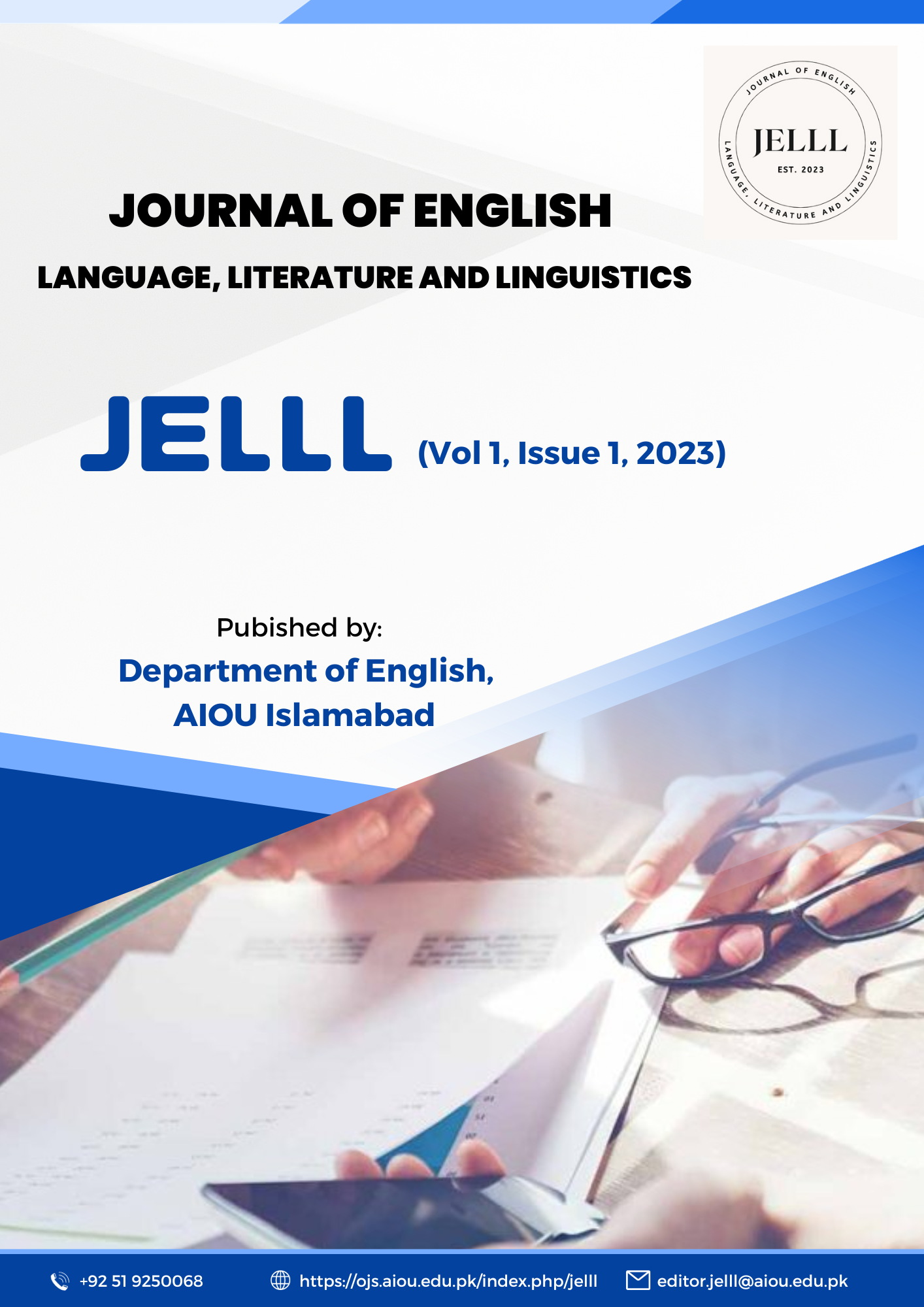The Interplay between Freedom and Confinement in No Exit by Taimur Kayani
Keywords:
No Exit, Dr Taimur Kayani, Existentialism, Freedom and Confinement, Sartre, Illegal immigration, Being and NothingnessAbstract
The present study explores the interplay between freedom and confinement in the play No Exit by Dr. Taimur Kayani. The researchers have analyzed the character of Mujtaba from the perspective of Jean-Paul Sartre’s philosophy of being-in-itself to being-for-itself, which Sartre describes in his book Being and Nothingness. Moreover, this study aims to consider the ideas of freedom vs. confinement, how Mujtaba’s erratic actions are harming his freedom, and how Mujtaba’s thinking is constrained by his culture, traditions, religion, and memories from his past. The researchers have utilized qualitative type of research and analyzed it descriptively. It shows that Mujtaba’s absurd thoughts and inner desires transform when he accepts the concept of ‘being for itself’ by Sartre. Kayani’s play bears the touches of Sartre’s theory of existentialism. It symbolizes that many Mujtabas in society have fallen into this situation in distant lands. It discusses various issues like injustice, family crises, and financial issues. The objective of the study is to explore the hard and grim conditions of illegal immigrants who remain empty-handed at the end of their journey, but still, they can get freedom by opting for the right choices. Furthermore, it concludes that Kayani wants his audience to get freedom before it is too late to lose their existence.
Downloads
References
Abdul, W., Muhammad, J. K., & IhsanUllah. (2021, March). Causes and Consequences of Illegal Emigration: A Case Study of District Swat, Pakistan. Pakistan Journal of Social Research, 3, 12. Retrieved from https://pjsr.com.pk/wp-content/uploads/2021/10/3.-Vol.3.Issue1_.-March-2021-Wahab-Causes-and-Consequances-of-Illegal-Emigration.pdf
Aisa, R., & Larramona, G. (2012, January 19). Illegal immigration from an economic point of view: a review. (2014). Retrieved from https://www.researchgate.net/publication/235736088_Illegal_immigration_from_an_economic_point_of_view_A_review
Bhatti, A. M., Iqbal, M., & Abbas, F. (2021). Methodic Analysis of Language Teaching in Access Microscholarship Program: A New Perspectiv. Competitive Social Science Research Journal, 2(3), 73-91.
Cline, A. (2019, January 27). Existence Precedes Essence: Existentialist Thought. Retrieved from https://www.learnreligions.com/existence-precedes-essence-existentialist-thought-249956
Dijn, A. D. (2020). Retrieved from https://time.com/5882978/freedom-definition-history/
Eltink, S. (2013, October 28). Freedom vs. Confinement. Retrieved from https://prezi.com/yiosoquhsvla/freedom-vs-confinement/
Ibrahim, G. A. (2018). Confinement and Freedom in Tennessee Williams’ The Glass Menagerie: A Research Paper. 18.
Jean-Paul Sartre (1905–1980). (n.d.). Retrieved from https://www.sparknotes.com/philosophy/sartre/section2/#:~:text=Being%2Din%2Ditself%20is%20concrete,consciousness%20but%20is%20also%20incomplete.
Kayani, T. (2021). No Exit. Auraq Publications.
Maduwanthi, I. (2020). Ariel’s Freedom is Always Postponed Due to Servitude. Thus, Does Ariel Actually Gain His Freedom at the End of The Drama, “The Tempest”; A Critical Evaluation—International Research Journal of Modernization in Engineering Technology and Science, 02.
Malik, M. A., Abbas, F., & Jawad, M. (2020). Narrative, Narrator and Narration: A structuralist and psycho-narrative reading of “The Kite Runner” by Khaled Husseini. Elementary Education Online, 19(4), 3746-3755.
McWilliams, W. C. (2011). The Democratic Soul. (J. D. Patrick, & J. M. Susan, Eds.) The University Press of Kentucky.
Mishra, B. (2021, July 30). Freedom and Responsibility Define the Human Essence in Sartre’s Philosophy. International Journal of Multidisciplinary Educational Research, 10.
Mittal, T. (2019, Sep 5). To be is to be: Jean-Paul Sartre on existentialism and freedom. Retrieved from https://yourstory.com/2017/06/jean-paul-sartre-philosophy-existentialis9m-freedom/amp
Oyeshile, O. A. (2015). Freedom and Human Value in Sartre’s Existentialism: An Appraisal. 06, 12.
Rawson, P. S. (2020, April 8). Southeast Asian arts. Retrieved from Encyclopedia Britannica: https://www.britannica.com/art/Southeast-Asian-arts. Accessed on 31 July 2022.
Sarfraz, K., & Sajid, M. A. (2020, July 15). Case Study of Irregular Migration from Pakistan to Europe. Journal of European Studies, 16. Retrieved from file:///C:/Users/TEMP/Downloads/8.IrregularMigrationformPakistantoEurope.pdf
Sedaris, D. (n.d.). Retrieved from https://www.azquotes.com/author/13268-David_Sedaris
Sullivan, K. (n.d.). Asian Theatre. Retrieved from https://create.piktochart.com/output/5013319-asian-theatre
Downloads
Published
How to Cite
Issue
Section
License
Authors shall retain the copyrights to the article. Author/s grant the journal an irrevocable,
non-exclusive license to publish the article electronically and in print format, and to identify
itself as the original publisher. Author(s) can grant any third party the right to use the article
freely as long as its original authors and citation details are identified. The article is
distributed under the Creative Commons Attribution 4.0 License. Unless otherwise stated,
associated published material shall be distributed under the same license.


